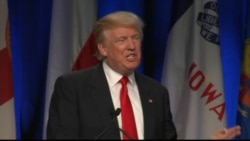Health issues engulfed the U.S. presidential campaign Monday, with Democrat Hillary Clinton resting from a bout with pneumonia while Republican Donald Trump wished her well, even as he suggested "something is going on" with her well-being.
Clinton recuperated at her suburban New York home, canceling a planned two-day trip across the country to California to raise money for her campaign and talk about the U.S. economy.
Trump has repeatedly raised doubts about Clinton's stamina and physical strength to be president. In interviews Monday, he raised questions about the Clinton campaign's account of her illness. It was diagnosed Friday by her personal physician but not disclosed until Sunday after a video showed her stumbling as she abruptly left a New York memorial ceremony on the 15th anniversary of the 2001 terrorist attacks and had to be helped into a van.
WATCH: Hillary Clinton after leaving 9/11 ceremony Sunday
Trump questions sincerity of disclosure
"Because they say pneumonia on Friday," Trump told one interviewer, "but she was coughing very, very badly a week ago and even before that if you remember, and this was not the first time."
Trump said he had a physical exam last week and will release statistics from his tests when the results are known.
He said, "I feel great but when the numbers come in, I'll be releasing very, very specific numbers."
To date, Clinton has released more information about her health than Trump, but not a detailed accounting of her health history. Her campaign said more information will be forthcoming later this week.
The two candidates are among the oldest to ever seek the U.S. presidency. Clinton is 68 and Trump is 70. If Trump were elected, he would be the oldest U.S. president in history. Clinton, if elected, would be the second-oldest U.S. president in history.
Trump and some of his most vocal supporters have suggested, without offering proof, that she suffers from the lingering effects of a 2012 fall in which she sustained a concussion and had a blood clot on her brain and double vision before doctors said she fully recovered.
WATCH: Trump responds to Clinton's "basket of deplorables comment"
Some media critics of Clinton complained about the two-day lag in announcing that she had pneumonia, as did David Axelrod, a former White House aide to President Barack Obama.
"Antibiotics can take care of pneumonia," Axelrod said on his Twitter account. "What's the cure for an unhealthy penchant for privacy that repeatedly creates unnecessary problems?"
Clinton campaign communications director Jennifer Palmieri conceded that "we could have done better [Sunday in releasing information], but it is a fact that the public knows more about [Clinton] than any nominee in history."
Democratic vice presidential candidate Tim Kaine remarks on Hillary Clinton's health:
Candidate swap?
One U.S. political analyst, Cokie Roberts of National Public Radio, suggested that some Democrats are "nervously beginning to whisper about her stepping aside and finding another candidate" to face Trump, even as Clinton continues to hold a narrow edge over him in national U.S. political surveys.
But Roberts said she thought such a turn of events is "unlikely to be a real thing," more the product of "an over-reaction" by Democrats nervous about the November 8 national election.
No U.S. presidential candidate has ever had to be replaced on the national Republican or Democratic tickets once they have been nominated by their political parties. If such an event were to occur, both parties have procedures in place to name new candidates, with their national committees voting on the selection.
U.S. presidential elections are not decided by a national popular vote, but rather in contests in each of the country's 50 states, with each state's importance in the overall outcome weighted by its population. The winning candidate has to collect a majority of at least 270 of the 538 votes in the Electoral College.
What happens if a candidate dies?
If a presidential or vice presidential candidate were to die between the date of the national popular vote and the time when the Electoral College meets, usually about six weeks later, the party leadership would name a replacement.
If a death occurred after the Electoral College certified the White House winner, the U.S. Constitution decrees that the vice president-elect would become the president-elect.
Deaths of top U.S. political figures in the immediate time frame of presidential elections have been rare.
In 1872, Horace Greeley, called the Liberal Republican nominee for president, died after the national election but before the Electoral College vote. But it mattered little because he already had lost the election to President Ulysses S. Grant, a Republican, who was running for a second term.
However, on two occasions, vice presidential candidates have had to be replaced after the political parties nominated them but before the national elections were held.
Vice President James Sherman, a Republican seeking re-election, died in 1912. Sixty years later, in 1972, Democratic vice presidential contender Thomas Eagleton withdrew from the ticket before the election after acknowledging that he had been hospitalized three times for depression and stress and had undergone electric shock therapy.








